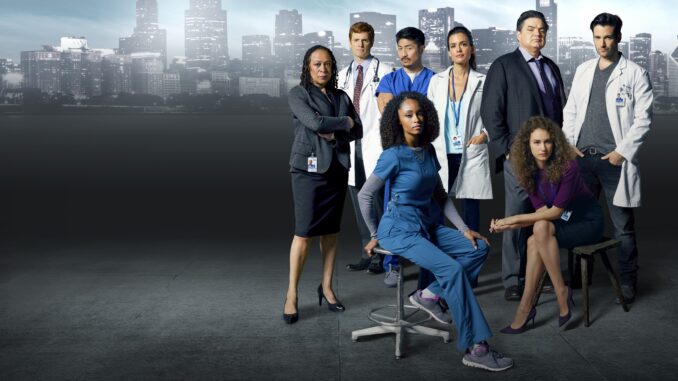
The Lingering Echoes and the Urgent New Beat: Chicago Med 2025
The year is 2025, and the Gaffney Chicago Medical Center stands as a gleaming monument to progress and peril. Its polished floors still hum with the relentless rhythm of life and death, but beneath the surface, a new pulse beats, driven by technology and a new generation of medical prodigies. Yet, as the future beckons with its promise of innovation, the echoes of the past refuse to be silenced, poised to reshape the very fabric of Chicago Med in ways no one could have predicted.
The initial tremor of change arrived subtly, manifesting in the sharp, clinical brilliance of Dr. Aris Thorne. A rising star in neuro-robotics and AI diagnostics, Thorne’s methods are as cutting-edge as his impeccably tailored suits. He navigates the hospital’s hallowed halls with an almost detached precision, his diagnostic software, codenamed “Aegis,” often proving more accurate than a veteran’s gut instinct. Thorne represents the future, a testament to what medicine could become – efficient, data-driven, and perhaps, a little less human. Alongside him is Dr. Lena Gupta, a dynamic and fiercely empathetic emergency room attending. Gupta, fresh from a stint with Doctors Without Borders, brings a raw, unflinching perspective on human suffering and a deep-seated belief in community care. Her no-nonsense approach often clashes with Thorne’s academic detachment, creating a compelling new friction point that grounds the futuristic setting in immediate, tangible human drama.
These new faces, along with a cadre of fresh residents and nurses, have brought a renewed energy to Gaffney. They tackle complex cases with zeal, pushing the boundaries of what’s possible, from organ printing to targeted genetic therapies. The old guard, Sharon Goodwin and Daniel Charles, have adapted, observing the transformation with a mix of pride and a lingering sense of their own fading era. They are the anchors, their wisdom a counterpoint to the impetuous drive of the young.
Then came the first whisper, a rumor circulating through the staff lounge like a low-grade fever. An old face, a name synonymous with Gaffney’s turbulent history, was returning. Speculation ran wild. Was it Choi, coming back from his mobile clinic? Or Rhodes, a phantom from a past tragedy? The answer arrived not in a grand announcement, but in the quiet, almost unassuming appearance of Dr. Will Halstead. He strode into the ED, the same weary slump in his shoulders, the same earnest intensity in his eyes, but with a gravitas born of years away, working in a clandestine, cutting-edge medical research facility on the west coast. His return was a shock, his reason cloaked in mystery – a new, controversial clinical trial he insisted could revolutionize heart failure treatment, and which he could only conduct at Gaffney, his first home. His presence immediately stirred the waters, challenging Thorne’s reliance on pure data with his own brand of intuitive, patient-centered care. Old friendships were reignited, old wounds subtly re-opened, and the ghost of a past romance hung heavy in the air.
But the real seismic shift, the true “md07” moment that sent shockwaves through the hospital, arrived weeks later. During a particularly chaotic shift in the pediatric ER, as Lena Gupta valiantly battled to save a young patient with an unexplained neurological condition, a familiar figure appeared, a blonde ponytail swishing as she moved with practiced grace. It was Dr. Natalie Manning, her presence an electric jolt. She hadn’t just returned to Chicago; she was back at Gaffney, reportedly to take over the head of pediatric ED. Her separation from Halstead years ago, her controversial departure, had left a void that no one truly believed could be filled by her return. The reunion between her and Will, in the sterile chaos of the ER, was less a dramatic embrace and more a charged silence, a complex tableau of history, regret, and undeniable connection played out against the backdrop of desperate medicine.
Chicago Med 2025 thus becomes a fascinating crucible. The new characters, Aris Thorne and Lena Gupta, represent the leading edge of medical practice, one driven by algorithmic perfection, the other by compassionate resilience. They bring fresh perspectives and innovative techniques, pushing Gaffney into an unknown future. Yet, the surprising return of Will Halstead and Natalie Manning grounds the narrative, reminding everyone of the enduring human element in medicine. Their presence is a poignant testament to the cyclical nature of life, love, and professional calling. They are the lingering echoes, now powerfully resonant, forcing the new guard to confront the legacy of those who came before.
This blend of fresh ambition and seasoned experience promises a season rife with compelling drama. Will Thorne’s AI surpass Halstead’s human intuition? Can Gupta’s unwavering empathy reconcile with Manning’s focused intensity? And what truly brought Will and Natalie back to the place they once called home, and to each other’s orbits? The Gaffney Chicago Medical Center of 2025 is not just evolving; it’s embarking on its most complex, most human, and most unpredictable chapter yet, where the future and the past collide in a symphony of healing and heartbreak.
